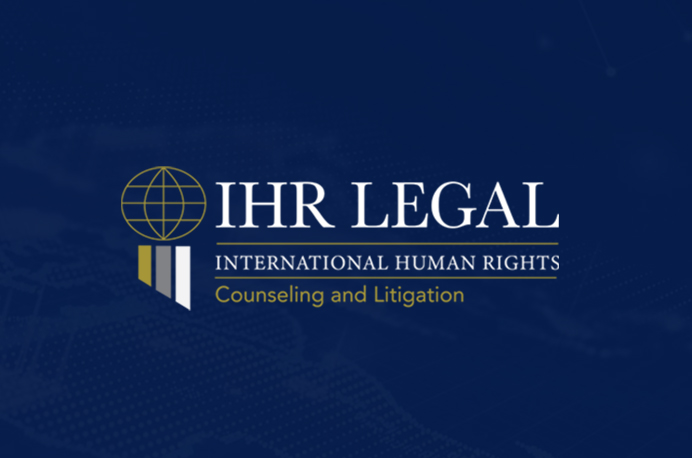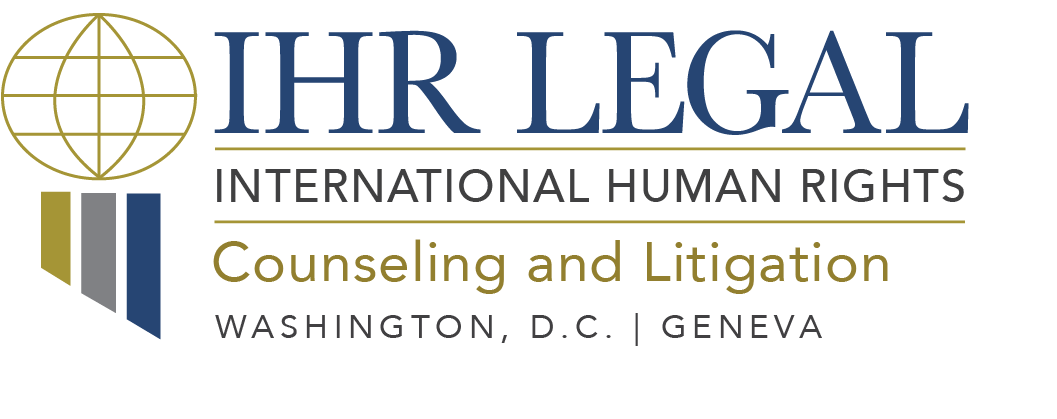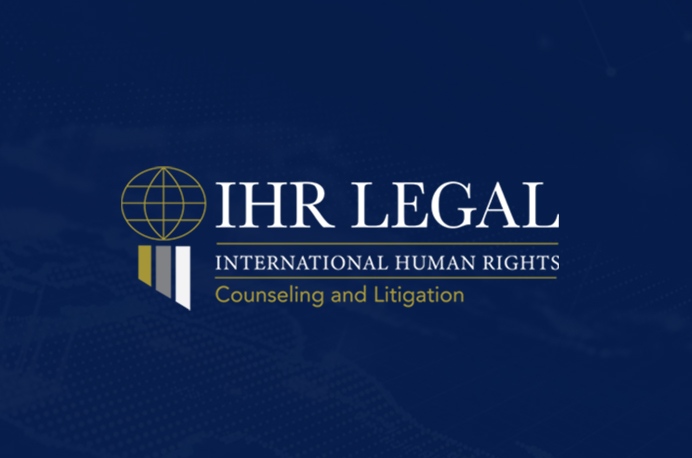
IHR LEGAL Newsletter
IHR LEGAL Newsletter
January – March 2022

In this issue:
News concerning the universal and regional systems for the promotion and protection of human rights.
Access Previous Issues:
IHR LEGAL Newsletter – October to December 2021
IHR LEGAL NewsletterIHR LEGAL NewsletterOctober - December 2021In this issue: News concerning the universal and regional systems for the promotion and protection of human rights from October to December 2021. Access Previous Issues:News concerning...
IHR LEGAL Newsletter – July to September 2021
IHR LEGAL NewsletterIHR LEGAL NewsletterJuly - September 2021In this Issue: New developments concerning the universal and regional systems for the promotion and protection of human rights. Access Previous Issues:New developments concerning the...
IHR LEGAL Newsletter – April to June 2021
IHR LEGAL NewsletterIHR LEGAL NewsletterApril - June 2021New developments concerning the universal and regional systems for the promotion and protection of human rights1. Office of the United Nations High Commissioner for Human Rights (OHCHR) The...
IHR LEGAL Newsletter – January to April 2021
IHR LEGAL NewsletterIHR LEGAL NewsletterJanuary - April 2021Selected developments concerning the universal system and regional systems for the promotion and protection of human rights 1. Office of the United Nations High Commissioner for Human...
News concerning the universal system and regional systems for the promotion and protection of human rights
I. UNIVERSAL HUMAN RIGHTS SYSTEM
1. Office of the United Nations High Commissioner for Human Rights (OHCHR)
The OHCHR is the leading human rights entity of the United Nations. Its functions include promoting and protecting all human rights, helping to empower people, and developing a human rights perspective into all United Nations programs. The current United Nations High Commissioner for Human Rights is Mrs. Michelle Bachelet.
News concerning the OHCHR:
— On March 30, 2022, High Commissioner, Michelle Bachelet, stated before the UN Human Rights Council that Russia indiscriminate attacks in Ukraine could constitute war crimes and serious violations of international humanitarian law and human rights. At the 49th Session of the Human Rights Council, the High Commissioner called on the Russian Federation to “immediately act to withdraw its troops from Ukrainian territory”. In this regard, the High Commissioner recalled that the UN Human Rights Monitoring Mission in Ukraine has recorded at least 1,189 deaths of civilian, including children.
Furthermore, the High Commissioner expressed her concern for the persistent use of explosive weapons with wide area effects in populated areas, damages to hospitals and medical facilities, conflict-related arbitrary detentions and sexual violence, threats to freedom of expression, displacement of millions of people, among others. The statement can be found here.
— On 18 January 2022, the OHCHR expressed deep concern about the situation in Sudan, with security forces killing and injuring peaceful protesters on an almost daily basis, and crackdowns being taken against those who criticize the authorities and independent journalists. Statistics from the Sudan Central Committee of Doctors show that state security forces have killed 71 people and injured more than 2,200 during protests since the October 25, 2021, coup. Of these, 17 people have been killed since the beginning of this year. The OHCHR called on the Sudanese authorities to stop targeting journalists, ensure full respect for the rights to freedom of expression and peaceful assembly, and facilitate peaceful protests instead of confronting them with unnecessary and disproportionate force. It further stated that journalists and media organizations must be able to carry out their work freely and safe from harassment and intimidation. The press release can be found here.
— March 21, 2022, marked the International Day for the Elimination of Racial Discrimination. This year’s theme was “Voices for Action against Racism” to highlight the importance of free and safe public participation and representation in all areas of decision-making to prevent and combat racial discrimination. The date is commemorated on March 21 because on that day, in 1960, 69 people were killed by the police in Sharpeville, South Africa, during a peaceful demonstration against the apartheid pass law, which restricted the movement of people of African descent. In the words of the High Commissioner, it is necessary to “ensure that people of African descent and those who oppose racism are protected and heard, and that their concerns are addressed”. The press release can be found here.
2. Human Rights Committee (HRC)
The HRC is the United Nations body of independent experts that monitors the implementation of the International Covenant on Civil and Political Rights by its States parties.
News concerning the HRC:
— On March 1, 2022, the HRC concluded its review of Qatar’s periodic report on measures taken to implement the provisions of the International Covenant on Civil and Political Rights. On the occasion, the experts asked about the State’s position on the death penalty. In his response, Ahman Hassen Al-Hammadi, secretary-general of the Qatari Ministry of Foreign Affairs, stated that the death penalty only applies to a small number of extremely serious crimes, can only be imposed when judges decide unanimously, and does not apply to pregnant women and mothers with children under two years of age. In addition, the secretary-general stated that Qatar had undergone extensive legislative, institutional, political, and strategic developments aimed at strengthening the protection of human rights in the State. The HRC recognized the importance of Qatar’s report and called on the State party to consider a moratorium on the application of the death penalty and to sign the Optional Protocol to the Covenant. The press release can be found here and Qatar’s initial periodic report here.
3. Committee on the Rights of the Child (CRC)
The CRC is the United Nations body of independent experts that monitors the implementation of the Convention on the Rights of the Child.
News concerning the CRC:
— On March 4, 2022, the CRC urged Russia to put an end to the killing of children in Ukraine.With at least 19 children killed and 31 injured in armed conflicts during the Russian invasion of Ukraine in recent days, the CRC demanded that Russia immediately cease its aggression and military actions and fulfill its obligations to protect children from physical and psychological violence. In its statement, the CRC recalled that the Convention on the Rights of the Child enshrines children’s rights to life, survival, and development, as well as the full range of rights to water, food, shelter, health, education, and freedom from all forms of violence. Children are entitled to care, assistance, and protection at all times. The press release can be found here.
II. AFRICAN HUMAN RIGHTS SYSTEM
1. African Commission on Human and People’s Rights (ACHPR)
The ACHPR is a quasi-jurisdictional body, within the framework of the African Union, whose main function is to protect and promote human and peoples’ rights in African countries. Its functions include processing complaints from individuals or States about human rights violations committed by States in the region, and receiving periodic reports from States on the human rights situation in their country.
News concerning the ACHPR:
— On January 20, 2022, the ACHPR issued a press release on the passing of Archbishop Emeritus Desmond Tutu on December 29, 2021. On the occasion, the ACHPR recalled that Desmond Tutu was the face of the liberation struggle, the voice of the people, and an essential prophetic voice during South Africa’s most difficult times. Desmond Tutu was appointed by President Nelson Mandela as chairman of the Truth and Reconciliation Commission, set up to investigate crimes committed during the apartheid era. The ACHPR highlighted the personal value of Archbishop Emeritus Desmond Tutu, especially his empathy with everyone. The press release can be found here.
III. EUROPEAN HUMAN RIGHTS SYSTEM
1. European Court of Human Rights (ECtHR)
The ECtHR is a judicial body of the Council of Europe whose main function is to monitor the compliance of States parties with the European Convention for the Protection of Human Rights and Fundamental Freedoms (ECHR). The ECtHR is responsible for analyzing complaints from individuals, groups of individuals, or States for human rights violations committed by States that have accepted the ECtHR’s jurisdiction.
News concerning the ECtHR:
— On January 18, 2022, the ECtHR handed down its judgment in the case of “Mehmet Çiftçi and Suat İncedere v. Turkey”. The case concerned a sanction imposed by the authorities of a prison on the applicants for singing hymns and reading poems in memory of prisoners who had lost their lives during the “Back to Life” operation carried out by the authorities in prisons in December 2000. The sanction consisted of one month’s deprivation of means of communication.
In this respect, the ECtHR considered that the disciplinary sanction imposed on the applicants constituted an interference with their right to freedom of expression. It held that, although the sanction imposed on the applicants was not very severe, the Government had not shown that the reasons cited by the national authorities as a justification for the measure complained of were relevant and sufficient, nor that the measure was necessary in a democratic society. The judgment in the case can be found here.
— On January 18, 2022, the ECtHR handed down its judgment in the case “Karuyev v. Russia”. The case concerned the applicant’s conviction for spitting on a portrait of President Putin in 2012, following his election. The applicant was found guilty of breach of public order and sentenced to 15 days of arrest. According to the ECtHR, spitting on President Putin’s portrait was an expression of his political opinion and had not provoked any public disturbance. The act also did not involve foul language, harassment, or property damage. Therefore, the ECtHR stated that it was not satisfied that the elements of the crime – “public nuisance” – under the relevant domestic law were established when the applicant was prosecuted. Furthermore, it found that his conviction was not “prescribed by law” within the meaning of the Convention. The judgment in the case can be found here.
IV. INTER-AMERICAN HUMAN RIGHTS SYSTEM
1. Inter-American Commission on Human Rights (IACHR)
The IACHR is the autonomous body of the Organization of American States (OAS) responsible for the promotion and protection of human rights in the Americas. One of its duties is to receive and review complaints from individuals for human rights violations and to monitor human rights situations.
News concerning the IACHR:
— On January 5, 2022, the IACHR filed a case against El Salvador before the IACHR Court on the absolute prohibition of abortion. The case refers to the international responsibility of the State for violations of the rights of Beatriz and her family due to the absolute prohibition of voluntary termination of pregnancy, which prevented her from having access to a legal, early, and timely abortion, in a situation of serious risk to her life, health and personal integrity, and the non-viability of extrauterine life of the fetus. Specifically, the IACHR considered that although the protection of life from conception constitutes a legitimate end, the criminalization of the termination of pregnancy when there is an incompatibility of the fetus with extrauterine life does not satisfy the requirement of suitability, since the non-viability of fetal life breaks the relationship of means to end between the criminalization and the purpose it pursues, since the protected interest (the life of the fetus), inevitably will not be able to materialize. The press release can be found here.
— On February 16, 2022, the IACHR expressed its concern about the continued detentions and prosecutions of people who participated in the protests in Cuba. As of February 7, of this year, more than 700 people remained imprisoned in Cuba for having participated in the July 2021 protests against the Cuban government, according to information from civil society. Prison conditions for these individuals include high levels of overcrowding, lack of access to potable water and adequate food, poor medical care, and the use of solitary confinement measures. About the judicial proceedings stemming from the July 11 protests, the Attorney General’s Office acknowledged that a total of 790 people are accused of “acts of vandalism, constituting crimes against authority, persons and property, as well as serious disturbances of public order”, and that prison sentences of up to 30 years will be imposed, according to official information released on January 24.
On the occasion, the IACHR urged the Cuban State to release all persons deprived of liberty for participating in the protests, including adolescents and adults, and to cease the practice of harassment and detentions in response to social protest. It also pointed out that the State must guarantee due process to all persons detained and accused of criminal activities, according to Inter-American standards. The press release can be found here.
2. Inter-American Court of Human Rights (IACtHR)
The IACtHR is a regional human rights court responsible for applying and interpreting the American Convention on Human Rights and other human rights instruments in the region. Its main function is to decide cases on human rights violations committed by States that have accepted its jurisdiction.
News concerning the IACtHR:
— On February 15, 2022, the IACtHR concluded its 146th Regular Session. The sessions were held from January 31 to February 15, 2022, and were held both in-person and virtually. During this session, the Inauguration Ceremony of the Inter-American Judicial Year 2022 was held, as well as the swearing-in of the new judges, and the inauguration of the new Executive Board 2022-2023. In addition, the following judgments were deliberated: a) Case “National Federation of Maritime and Port Workers (FEMAPOR) v. Peru” and b) Case “Pavez Pavez v. Chile”. The Tribunal also heard several matters related to monitoring compliance with judgments, provisional measures, and dealt with different administrative matters. The press release can be found here.
— On February 15, 2022, the Inter-American Court held a public hearing in the “Movilla Galarcio et al. v. Colombia” case. The case relates to the alleged forced disappearance of Pedro Julio Movilla, union leader, militant of the leftist political party PCC-ML, and Colombian social activist, which occurred on May 13, 1993. It was alleged that there are multiple circumstantial evidence and contextual elements to attribute the disappearance of the victim to the State. Thus, the petitioners stated that at least three relevant contexts converged for the case: the context related to the identification of trade unionists within the notion of an internal enemy in the State’s intelligence and counter-guerrilla manuals; the political violence in Colombia, which resulted in alarming numbers of executions and disappearances of persons linked to certain political parties with the characteristics of the PCC-ML; and the high incidence of forced disappearances in the context of the armed conflict in Colombia.
Additionally, they stated that faced with the news of the disappearance, there was a hasty rejection of the habeas corpus filed to find his whereabouts, which resulted in a refusal to establish the detention and fate of the alleged victim. The recording of the public hearing can be found here and more information on the case (in Spanish) here.
Access Previous Issues:

IHR LEGAL Newsletter – April to June 2021
Joint Statement on the eve of the International Day against Homophobia, Lesbophobia, Biphobia and Transphobia; Statement by UN High Commissioner for Human Rights, Michelle Bachelet, on the increase of human rights violations and abuses in Mali; Statement by the African Commission on Human and Peoples’ Rights on the occasion of the International Day in Support of Victims of Torture; and much more here.

IHR LEGAL Newsletter – January to April 2021
Statement on the George Floyd case by UN High Commissioner for Human Rights, Michelle Bachelet; IACHR Resolution on “COVID-19 vaccines in the framework of Inter-American Human Rights obligations”; African Commission on Human and Peoples’ Rights Resolution on the excessive use of force by agents of African States; and much more here.



